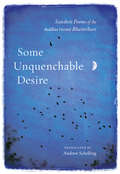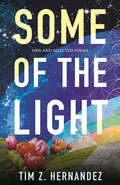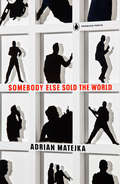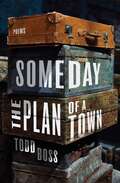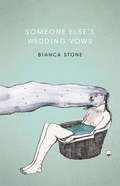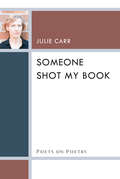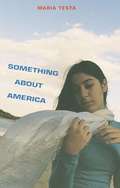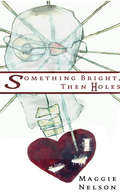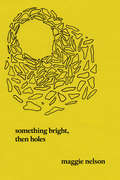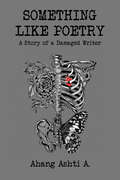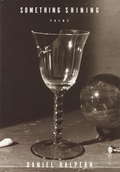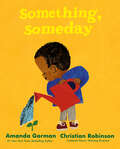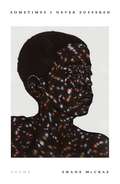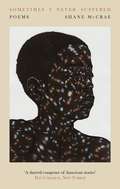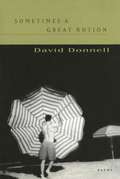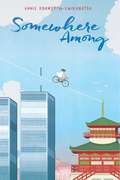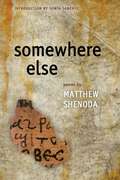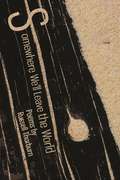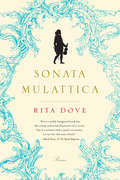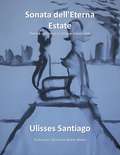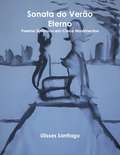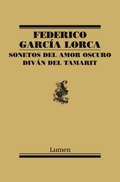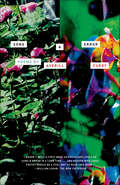- Table View
- List View
Some Unquenchable Desire: Sanskrit Poems of the Buddhist Hermit Bhartrihari
by BhartrihariAn award-winning translator finds surprisingly modern themes in a selection of erotic and religious stanzas from one of classical India's most celebrated poets.Although few facts are known about his life, the Indian poet Bhartrihari leaps from the page as a remarkably recognizable individual. Amidst a career as a linguist, courtier, and hermit, he used poetry to explore themes of love, desire, impermanence, despair, anger, and fear. “A thousand emotions, ideas, words, and rhythmic syllables stormed through him,” writes translator Andrew Schelling in an evocative introduction. “In particular he shows himself torn between sexual desire and a hunger to be free of failed love affairs and turbulent karma.” Schelling’s translation represents a rare opportunity for English-language readers to become acquainted with this fascinating poet. Attuned to Bhartrihari’s unique poetic sensibility, Schelling has produced a compelling, personally curated set of translations.
Some of the Light: New and Selected Poems (Raised Voices)
by Tim Z. Hernandez25 years of writing from one of our most gifted Latinx poets, featuring work from early explorations of machismo to new meditations on life as a single father, immigrant detention, and spiritual inquirySome of the Light gathers the first 25 years of Hernandez&’s award-winning poetry, offering 28 new poems and a glimpse at the trajectory of a rising contemplative American author.At its core, Some of the Light contains collected poems of love, told through the lens of a single father raising two children alone in the borderlands. They are at times intimate and confessional, ranging from personal relationships to spiritual inquiry, from human rights to the environment, while between the cracks of the poems are poetic contemplations, chronicling the passing days of the pandemic.This latest work by Hernandez reveals a writer whom former US poet laureate Juan Felipe Herrera calls &“a titan—unafraid to take to the road, get his hands dirty, to fully immerse himself in the world of his subjects.&”Some of the Light is a part of Beacon Press's Raised Voices poetry series, established in 2021 to raise historically excluded voices and perspectives, and to celebratepoetry&’s ability to access truths in ways no other form can.
Somebody Else Sold the World (Penguin Poets)
by Adrian MatejkaA resonant new collection on love and persistence from the author of The Big Smoke, a finalist for the National Book Award and the Pulitzer PrizeThe poems in Adrian Matejka's newest and fifth collection, Somebody Else Sold the World, meditate on the ways we exist in an uncontrollable world: in love and its aftermaths, in families that divide themselves, in protest-filled streets, in isolation as routines become obsolete because of lockdown orders and curfews. Somebody Else uses past and future touchstones like pop songs, love notes, and imaginary gossip to illuminate those moments of splendor that persist even in exhaustion. These poems show that there are many possibilities of brightness and hope, even in the middle of pandemics and revolutions.
Someday the Plan of a Town: Poems
by Todd BossPoems of wayfaring and wayfinding, recovery and discovery, from “one of the best poets of his generation” (Elizabeth Lund, Washington Post). In 2018, acclaimed poet Todd Boss sold his belongings and began to circle the globe in a series of consecutive housesits. Reeling from marital, parental, and societal losses, Boss risks everything to be at one with the world. These poems conjure Spanish dust, English rain, French moss, Arizona cliffs, and Hungarian light, ringing all the while with timeless humor and wisdom. As much a commentary on modern-day America as a personal history replete with grief, Someday the Plan of a Town is a sensual, intellectual, and arrestingly musical map of one nomadic troubadour’s journey to self.
Someone Else's Wedding Vows
by Bianca StoneSomeone Else's Wedding Vows reflects on the different forms of love, which can be both tremendously joyous and devastatingly destructive. The title poem confronts a human ritual of marriage from the standpoint of a wedding photographer. Within the tedium and alienation of the ceremony, the speaker grapples with a strange human hopefulness. In this vein, Stone explores our everyday patterns and customs, and in doing so, exposes them for their complexities. Drawing on the neurological, scientific, psychological, and even supernatural, this collection confronts the difficulties of love and family. Stone rankles with a desire to understand, but the questions she asks are never answered simply. These poems stroll along the abyss, pointing towards the absurdity of our choices. They recede into the imaginative in order to understand and translate the distressing nature of reality. It is a bittersweet question this book raises: Why we are like this? There is no easy answer. So while we look down at our hands, perplexed, Someone Else's Wedding Vows raises a glass to the future.
Someone Shot My Book
by Julie CarrApproaching the practices of reading and writing from a feminist perspective, Julie Carr asks vital ethical questions about the role of poetry—and of art in general—in a violent culture. She addresses issues such as the art of listening, the body and the avant-garde, gun violence, police brutality, reading and protest, and feminist responses to war in essays that are lucid, inventive, and informed by a life lived with poetry. Essays on poets Lorine Niedecker, Jean Valentine, Anne Carson, Lyn Hejinian, and Lisa Robertson detail some of the political, emotional, and spiritual work of these forerunners. A former dancer, Carr also takes up question of text, dance, performance, and race in an essay on the work of choreographer, writer, and visual artist Ralph Lemon and poet Fred Moten. Carr’s essays push past familiar boundaries between the personal/confessional and experimental/conceptual strains in American poetry. Pressing philosophical inquiries into the nature of gender, motherhood, fear, the body, and violence up against readings of twentieth- and twenty-first-century poets, she asks us to consider the political and affective work of poetry in a range of contexts. Carr reports on her own practices, examining her concerns for research and narrative against her investment in lyric, as well as her history as a dancer and her work as curator and publisher. Carr’s breadth of inquiry moves well beyond the page, yet remains grounded in languages possibilities.
Something About America
by Maria TestaImmigration in contemporary America is explored in a powerful lyric novel from award-winning poet Maria Testa. What happens to a dream divided? Draping colorful scarves around her neck, the thirteen-year-old from Kosova thinks of herself as a typical American schoolgirl, happy to blend into eighth grade with her friends. But for her parents, seeking a new life in Maine was not a choice but a necessity -- a way to escape from a war and find medical care for a daughter burned in a fire that scarred her up to her chin. While her underemployed parents still talk about "home" and continue to feel like foreigners ten years later, their daughter is torn between the guilt about their displacement and pride in her new identity. Then a hateful event changes everything, stirring passions throughout the entire region and forcing residents old and new to re-examine what it means to be an American. Narrated by the young daughter from Kosova, the nuanced and deeply moving immigration tale was inspired by true events: In October 2002, the mayor of Lewiston, Maine wrote a letter to the elders of the local Somali community, asking them to turn future refugees away because the town was "maxed-out physically, financially, and emotionally." Seizing the opportunity, a racist group staged a rally that drew thirty people, only to be met by some six thousand residents in support of the Somalis -- people of all cultures and backgrounds who knew something about America.
Something Bright, Then Holes
by Maggie NelsonMaggie Nelson's fourth collection of poems combines a wanderer's attention to landscape with a deeply personal exploration of desire, heartbreak, resilience, accident, and flux. Something Bright, Then Holes explores the problem of losing then recovering sight and insight - of feeling lost, then found, then lost again. The book's three sections range widely, and include a long sequence of Niedecker-esque meditations written at the shore of a polluted urban canal, a harrowing long poem written at a friend's hospital bedside, and a series of unsparing, crystalline lyrics honoring the conjoined forces of love and sorrow. Whatever the style, the poems are linked by Nelson's singular poetic voice, as sly and exacting as it is raw. The collection is a testament to Nelson's steadfast commitment to chart the facts of feeling, whatever they are, and at whatever the cost.
Something Bright, Then Holes: Poems
by Maggie NelsonBefore Maggie Nelson’s name became synonymous with such genre-defying, binary-slaying writing as The Argonauts and The Art of Cruelty, this collection of poetry introduced readers to a singular voice in the making: exhilarating, fiercely vulnerable, intellectually curious, and one of a kind.These days/the world seems to split up/into those who need to dredge/and those who shrug their shoulders/and say, It’s just something/that happened.While Maggie Nelson refers here to a polluted urban waterway, the Gowanus Canal, these words could just as easily describe Nelson’s incisive approach to desire, heartbreak, and emotional excavation in Something Bright, Then Holes. Whether writing from the debris-strewn shores of a contaminated canal or from the hospital room of a friend, Nelson charts each emotional landscape she encounters with unparalleled precision and empathy. Since its publication in 2007, the collection has proven itself to be both a record of a singular vision in the making as well as a timeless meditation on love, loss, and―perhaps most frightening of all―freedom.
Something Like Poetry – A Story of a Damaged Writer
by Ahang Ashti A.I see a pile of the wreckage of a human. But I can still visualize the statue of beauty you used to be; Still, among all the ashes, the tears, the damaged parts, And the cold touch of your buried pain. After all, it was I who demolished you, And it was the sound of your crumbling that awakened me.
Something Shining
by Daniel HalpernWidely praised for his earlier collections, Daniel Halpern has grown steadily in stature and attainment. Now, withSomething Shining, his first collection of new poems in seven years, he gives us an ambitious, wide-ranging meditation on birth, love, and maturity, marking a turning point in both his life and his work. These beautifully crafted poems explore relations between lovers, between friends, between fathers and children. Written by the light of a young daughter's presence, in the distinctive lyrical language that Ted Hughes described as "so free and effortless and unerring," these poems ponder the fading of the body and the struggle that consciousness wages to keep the self afloat. And into this intimate world also enter a surprising array of characters: ancient Chinese poets and modern Cuban musicians, Charlie Parker, Chekhov, and the dervish mystic Rumi. But it is the poet's awareness of his own frailty ("the days run out--no longer oneself," he writes in "Fugue"), that, together with the extraordinary beauty he discovers in environments familiar and exotic, unifies this collection. The work of a poet at the top of his form,Something Shiningconfirms Halpern's place in our national literature.
Something, Someday
by Amanda GormanThe stunning new picture book by presidential inaugural poet Amanda Gorman and Caldecott Honor-winning illustrator Christian Robinson. <p><p>You’re told that This won’t work,But how will you know If you never try? <p><p>Presidential inaugural poet and #1 New York Times bestselling author Amanda Gorman and Caldecott Honor and Coretta Scott King Honor winner Christian Robinson have created a timeless message of hope. Sometimes the world feels broken. And problems seem too big to fix. But somehow, we all have the power to make a difference. With a little faith, and maybe the help of a friend, together we can find beauty and create change. <p><p>With intimate and inspiring text and powerfully stunning illustrations, Something, Someday reveals how even the smallest gesture can have a lasting impact. <p> <b>New York Times Bestseller</b>
Sometimes I Never Suffered: Poems
by Shane McCraeSpanning religious, historical, and political themes, a new collection from the award-winning poet I think now more than halfOf life is death but I can’t dieEnough for all the life I seeIn Sometimes I Never Suffered, his seventh collection of poems, Shane McCrae remains “a shrewd composer of American stories” (Dan Chiasson, The New Yorker). Here, an angel, hastily thrown together by his fellow residents of Heaven, plummets to Earth in his first moments of consciousness. Jim Limber, the adopted mixed-race son of Jefferson Davis, wanders through the afterlife, reckoning with the nuances of America’s racial history, as well as his own. Sometimes I Never Suffered is a search for purpose and atonement, freedom and forgiveness, imagining eternity not as an escape from the past or present, but as a reverberating record and as the culmination of time’s manifold potential to mend.
Sometimes I Never Suffered: Shortlisted for the T S Eliot Prize 2020
by Shane McCraeSHORTLISTED FOR THE T S ELIOT PRIZE 2020'Out of personal history, out of the history of an enduringly fractured nation, and out of the deep history of language, Shane McCrae is writing the most urgent, electric poems of his generation' Garth Greenwell'Shane McCrae is one of our best, a great poet who mines the rhythms and vernacular of America, excavating the most exquisite of poems. His work is risky, not risqué; intelligent, not clever; deep, not jocular surface play. He is sui generis' Rabih AlameddineI think now more than halfOf life is death but I can't dieEnough for all the life I seeIn Sometimes I Never Suffered, Shane McCrae remains 'a shrewd composer of American stories (Dan Chiasson, New Yorker). Here, an angel, hastily thrown together by his fellow residents of Heaven, plummets to Earth in his first moments of consciousness. Jim Limber, the adopted mixed-race son of Jefferson Davis, wanders through the afterlife, reckoning with the nuances of America's, as well as his own, racial history.Sometimes I Never Suffered is a search for purpose and atonement, freedom and forgiveness, imagining eternity not as an escape from the past or present, but as a reverberating record and as the culmination of time's manifold potential to mend.
Sometimes a Great Notion
by David DonnellLong admired for his books of poetry, most recently China Blues and Dancing in the Dark, David Donnell’s poems continue to surprise and amaze us with their cool jazz of spontaneity and imaginative logic. A sensual and intellectual feast, Sometimes a Great Notion is a deconstruction of the contemporary artist’s life; it’s also a tough, compassionate look at the future of the future and our philosophy of love. Culinary adventures and geography juxtapose with Japanese culture, erotic interludes are interrupted by notes on Alex Colville, giving us the clearest picture of convergence theory we’ve had since Marshall McLuhan was a young man. Here, in poems like “Luce” or “Pillows,” Donnell pushes the boundaries of minimalism in original and subtle ways and succeeds like peach ice cream on a hot day. Moment after moment, this is a provocative and refreshing book.
Somewhere Among
by Sonia Chaghatzbanian Annie Donwerth-ChikamatsuA beautiful and haunting debut novel in verse about an American-Japanese girl struggling with the loneliness of being caught between two worlds when the tragedy of 9/11 strikes an ocean away. <P><P>Eleven-year-old Ema has always been of two worlds--her father's Japanese heritage and her mother's life in America. She's spent summers in California for as long as she can remember, but this year she and her mother are staying with her grandparents in Japan as they await the arrival of Ema's baby sibling. <P><P>Her mother's pregnancy has been tricky, putting everyone on edge, but Ema's heart is singing--finally, there will be someone else who will understand what it's like to belong and not belong at the same time. But Ema's good spirits are muffled by her grandmother who is cold, tightfisted, and quick to reprimand her for the slightest infraction. <P><P> Then, when their stay is extended and Ema must go to a new school, her worries of not belonging grow. And when the tragedy of 9/11 strikes, Ema, her parents, and the world watch as the twin towers fall... <P><P>As Ema watches her mother grieve for her country across the ocean--threatening the safety of her pregnancy--and her beloved grandfather falls ill, she feels more helpless and hopeless than ever. <P><P>And yet, surrounded by tragedy, Ema sees for the first time the tender side of her grandmother, and the reason for the penny-pinching and sternness make sense--her grandmother has been preparing so they could all survive the worst. <LP><P>Dipping and soaring, Somewhere Among is the story of one girl's search for identity, inner peace, and how she discovers that hope can indeed rise from the ashes of disaster.
Somewhere Else
by Matthew ShenodaFrom the river Nile to the teeming streets of Cairo, from the indigenous, pre-Islamic Egyptian Coptic civilization to an America struggling with its fear of the Arab world, Shenoda's poems recall the sacred traditions of an ancient, enduring culture as they widen the political conversation surrounding ethnicity, pan-Africanism and pan-Arabism. This notable collection spans generational, political and cultural divides, providing a nuanced perspective virtually unknown in the West. Matthew Shenoda is a Coptic poet influenced by jazz musicians and the writers of the Black Arts Movement. He teaches at San Francisco State University and works as a community and racial justice activist in the Bay Area. Widely anthologized, his articles, essays and poems have appeared in the San Francisco Chronicle, The Bloomsbury Review and Newsday.
Somewhere We'll Leave the World
by Russell ThorburnThe poems in Russell Thorburn’s Somewhere We’ll Leave the World are fluid and masterful with a flow that captures an authentic consciousness. These poems breathe and allow the reader breathing room. Powerful images and deft endings arrive like the best kind of emotional left hook—the kind that leaves you wanting more. This book is for long-walkers and dreamers who don’t mind the cold or heat or the miles ahead. The reader is taken on a journey through snowy woods, stopping to confront a wolf or meet with Jim Harrison. Divided into four sections, Somewhere We’ll Leave the World draws on the poet’s own experiences while imagining chance encounters with fictional characters and personal heroes. Before long, it is obvious to the reader that every moment is up for grabs—a late night viewing of Hell Is for Heroes, a drive down Woodward Avenue in a friend’s Volkswagen, a hike through the Mojave National Preserve. Through the book’s filmic scenes, imagine Wim Wenders behind the camera as the poet re-creates the scenes of his own life. In good company with the likes of Charles Bukowski and James Wright, Thorburn tips his hat to those who have come before him, while blazing his own winding and fantastical trail. This thoroughly unique poetry collection gives us an honest and lyrical assessment of national wounds. Fans of surreal poetry will relish Thorburn’s work.
Somewhere in the Ocean
by Jennifer Ward T. J. MarshA counting book in rhyme presents various marine animals and their children, from a mother manatee and her little calf one to a mother octopus and her little babies ten. Complete with a glossary, musical score, and numbers hidden in the illustrations.
Sonata Mulattica: Poems
by Rita DoveDetailing the volatile relationship between the black violinist George Bridgetower and Beethoven, this is a "masterful collection" (Los Angeles Times). The son of a white woman and an "African Prince," George Polgreen Bridgetower (1780-1860) travels to Vienna to meet "bad-boy" genius Ludwig van Beethoven. The great composer's subsequent sonata is originally dedicated to the young mulatto, but George, exuberant with acclaim, offends Beethoven over a woman. From this crucial encounter evolves a grandiose yet melancholy poetic tale. A New Yorker's A Year's Reading; Booklist Editors Choice Award.
Sonata dell'Eterna Estate
by Ulisses SantiagoPoema Sinfonico in cinque movimenti.In questo magnifico lavoro, l'autore esprime espressamente un sentimento molto umano, intransigente e preciso sulla propria visione della filosofia della vita, sottolineando le situazioni della vita quotidiana come punti di riferimento del sentimento generato vivendo in città cosmopolite di alto movimento in tutti sensi della vita e come influenza l'ambiente nel sentimento dell'individuo.
Sonata do Verão Eterno
by Ulisses Santiago John KlebisonSonata do Eterno Verão Poema Sinfônico em Cinco Movimentos de Ulisses Santiago Versão original em espanhol por Ulisses Santiago Primeiro Prêmio de Poesia de 1983 da Jornada Literaria de la Montaña em Porto Rico. Segunda Edição Ampliada 2018 Traduzido para o português por John Klebison Ferreira Pinturas em Tinta Originais de Ulisses Santiago UARTSTUDIOS Editores.
Soneteando el amor
by Aldivan Teixeira Torres Alondra Silva MuñozAproximadamente cincuenta poemas con tema central el amor que muestran la alma del autor.
Sonetos del amor oscuro y Diván del Tamarit
by Federico García LorcaLas dos últimas obras de Lorca. Cuando Lorca fue asesinado en 1936, estaba en el apogeo de su madurez literaria, como demuestran las dos últimas obras que escribió: Diván del Tamarit y Sonetos del amor oscuro. Una y otra se complementan para dar lo mejor de Lorca: su dimensión popular y la valiente indagación en los claroscuros del deseo, con una claridad y crudeza que nunca antes se había permitido. Tras estar muchos años fuera de circulación, recuperamos en un solo volumen dos obras fundamentales de la poesía española del siglo XX.
Song & Error: Poems
by Averill CurdyA lush, lyrical debut from a vibrant new poetic voiceA sparrow like a "fumbled punch line" is lost in an airport; a man translating Ovid is transfigured by witnessing a massacre in Jamestown in 1621; a woman smiles seductively as the skin on her back is opened out like a wing; a lizard upon a laptop shimmers with the true life, primitive and binary, of our modern information age.In the sonically rich, formally restless poems of this debut collection, Song & Error, the thread that unravels all we think we know of the world is plucked loose and drawn from a seal's beached corpse. Uniting past and present, history and autobiography, Averill Curdy's poems strive to endure within "the crease of transformation" and to speak-sing-of that terrible beauty.
